Statista expects revenues from the eCommerce software market to reach $6.53 billion in 2021, and this huge figure means that enterprise eCommerce platforms are gaining traction in today’s business world. Why do companies use them and how do you choose one? Read this article to learn.
What Is an Enterprise eCommerce System?
Business requirements significantly differ depending on the company’s size and volume of its operations. When a low-profile company evolves into a large enterprise that engages thousands of employees and earns seven-figure sums, it should consider adopting an enterprise eCommerce system.
An enterprise eCommerce system is software that enables a full range of processes and operations related to trade and commerce, both offline and online.
There are plenty of options for SMEs, but large companies can access only a limited number of eCommerce solutions that are capable of handling their business needs. A good solution shouldn’t limit itself to commercial operations; it should embrace a full range of near-commercial tasks on a single platform. In this way, inventory and order management, accounting, customer relationship management, resource planning, marketing, reporting and analytics, and other functionalities appear under the solution’s umbrella.
Request SaM Solutions’ ecommerce development services to grow your client base and boost profitability of your online sales.
The following are hallmark must-have functionalities that good enterprise eCommerce platforms provide to businesses they serve:
- High scalability and flexibility to extend and improve alongside business growth
- Efficient managing of extended product catalogs and numerous product pages
- Single-platform management of multiple locations, sites and currencies
- User-friendly and intuitive UX, UI and checkout process
- Focus on providing seamless customer experience
- Flexibility and feature scaling
- Omnichannel content delivery and commerce
- AI-based personalized recommendations
- Branded look and feel
- Seamless integration with CRM, accounting, ERP, marketing and other related modules, and with brick-and-mortar-store software
- Support for B2B and B2C commerce (support for other types, such as B2B2C, C2C, C2B, etc., is also highly recommended)
- Support for Commerce
- High security and reliability
Of course, such versatility increases related expenditure but significantly enhances efficiency and business performance.
Types of Enterprise eCommerce Software
As the number and variety of eCommerce operations increases, so does the versatility of enterprise eCommerce software. There are many types of software, depending on the commercial operations they perform and on their technical specifics. Let’s get to know the most popular.
Types of Enterprise eCommerce Software according to Functionality
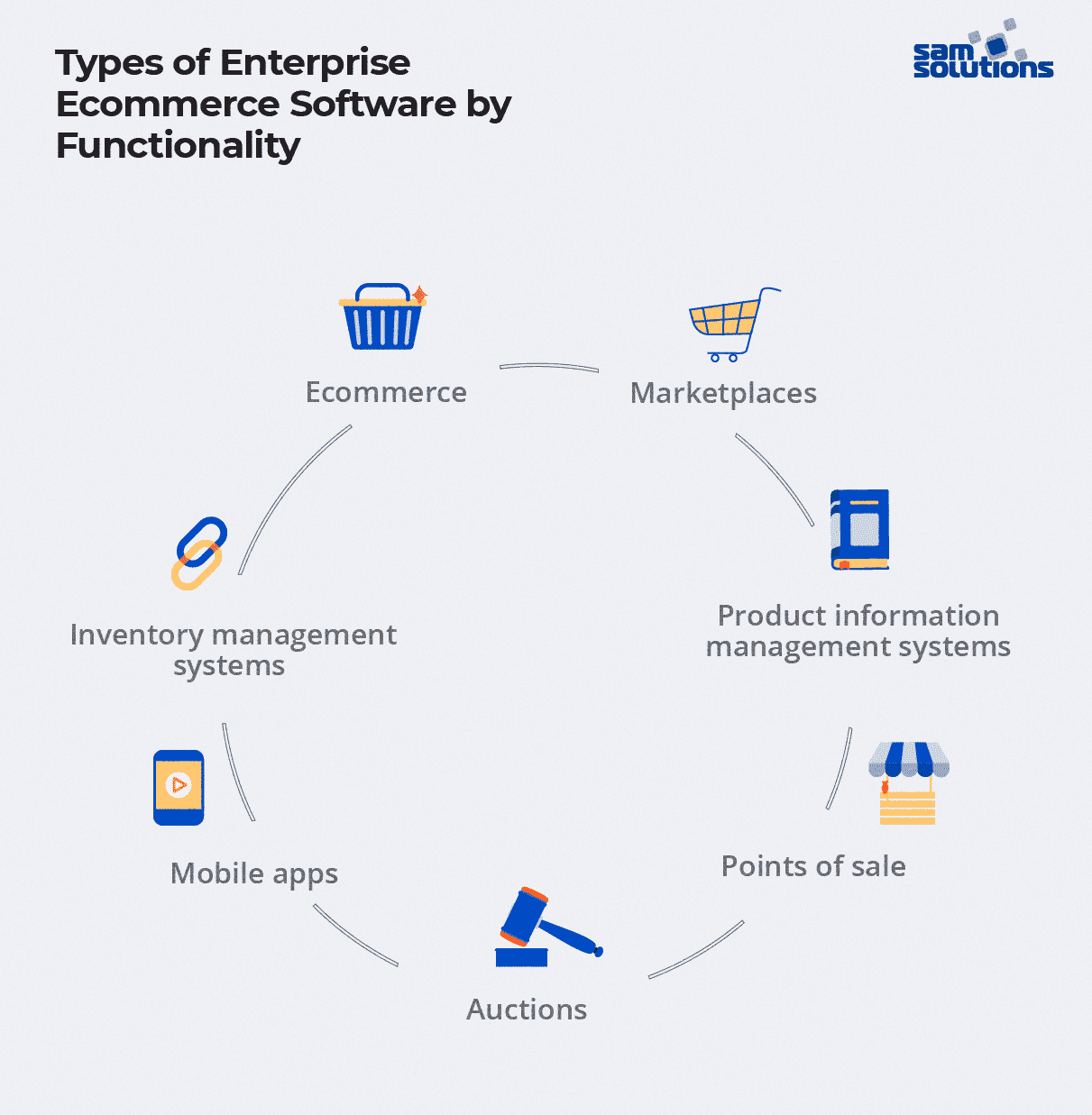
As a rule, large companies make the most of what the current software market provides and use the following types of solutions:
- Ecommerce suites that handle all business processes, steps of the customer journey and user communication channels
- Marketplaces that bring together numerous third-party sellers on a single platform
- Product information management systems that administer all product-related data
- Inventory management systems that monitor product availability
- Mobile apps that connect the brand and its customers using mobile devices
- Points of sale that help the brand reach its customers where they customers round
- Auctions that automate biddings
Types of Enterprise eCommerce Software according to Technicality
In addition to functionality, companies also have to choose proper hosting options. As enterprise eCommerce solutions handle both frontend and backend operations, the choice should be well thought out and considered.
There are the following options of the hosting environment for enterprise software:
- On-premises or on-site. Companies locate their solutions on their own servers and exclusively for their own use, which requires self-hosting and shifts the responsibility for the code and the server on the owner, providing high speed and scalability. Until recently, this has been the most popular hosting option.
- Cloud-based:
- Open-source. With this extremely collaborative type, a company owns the software code and controls server operation while welcoming extraneous improvements. As with solutions located on the premises, the company is responsible for software security and maintenance and the support of the IT department, which entails significant investments, risks and spent time. At the same time, it offers endless customization capabilities and flexibility.
- SaaS. This increasingly popular option allows businesses to avoid huge investments in cloud hosting, platform maintenance, security, etc., as it is based on rented capacities. In this way, the responsibility for many technical aspects is outsourced to a third party, which reduces risks and the cost of ownership, while depriving a company of complete control over the code and backend.
The underlying architecture also determines the enterprise eCommerce software type:
- Monolith. Software with traditional, interconnected architecture, featuring highly coupled backend and frontend.
- Headless. Microservices-based, decoupled architecture detaches the frontend from the backend and enables their connection with the help of APIs, which encourages greater flexibility, speed and control. In eCommerce, this means that the system has all required modules, but it’s more flexible and can provide more user-specific experiences. Currently, headless solutions are gaining traction.
Benefits of Enterprise eCommerce Software
Efficient enterprise eCommerce software has many functionalities and business operations under its umbrella, providing incredible benefits to companies that use it:
- Customer engagement. Customer conversion and retention rates are high as the solution is user-friendly and reliable and customers enjoy using it.
- Business efficiency. As a result of streamlined processes, the workflow and related expenses are optimized.
- Data-driven decisions. Decision-making is based on data, analytics and insights.
- Individualized customer approach. The solution addresses customers in the most personal manner, knowing what matters for them and using recommendations and relevant content.
- Wide customer reach. Users are approached at any convenient time and via all convenient channels.
- Brand recognition. A company creates, maintains and replicates its recognizable look and feel.
- Technical excellence. A company enjoys the best capabilities and security options and doesn’t face limits on product variations, storage, traffic, etc.
- Near-endless scalability. The solution easily adjusts to the company’s requirements, however demanding they may be.
- Flawless integration with other system modules. The enterprise eCommerce software doesn’t exist in silos; it seamlessly interacts with other solutions that are used by a company.
Choosing the Right eCommerce Platform for Your Enterprise: Key Steps
Choosing the right solution for a huge enterprise eCommerce business is a complicated process that requires proper research and collaboration. Usually, this choice consists of a few decisions, with the final decision probably being some sort of compromise.
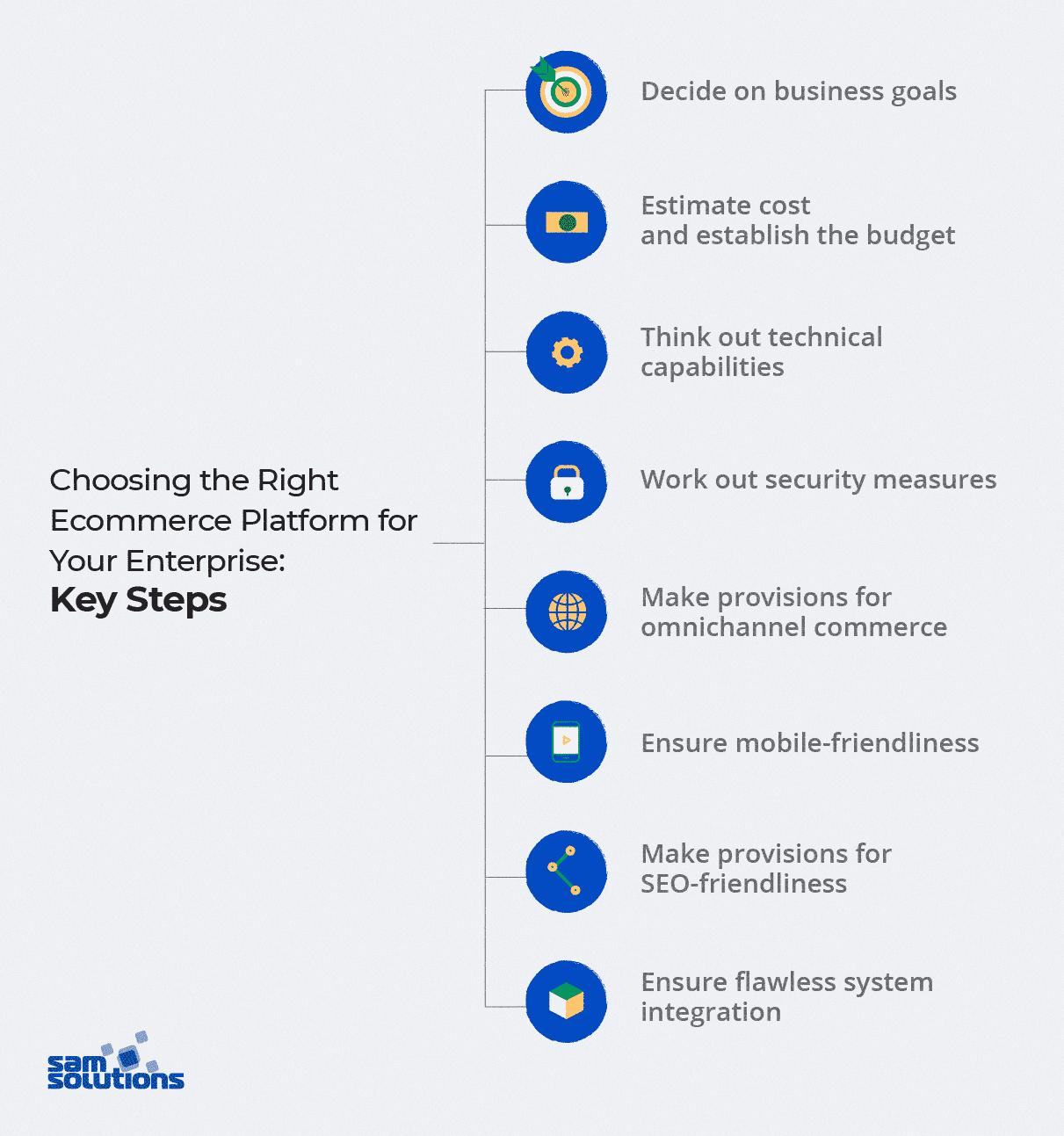
Decide on Business Goals
What do you expect your enterprise eCommerce solution to help you accomplish? As a rule, companies expect it to help them achieve many, if not all, of the following goals:
- Increase profits and business performance
- Reduce extraneous expenditures and the cost of ownership
- Enhance scalability, stability, flexibility and operation speed
- Establish efficient data analysis and reporting
- Optimize employee load
- Improve UX and UI
- Introduce support for multiple stores and payment gateways
- Provide seamless integration with other components of the IT landscape
Estimate Cost and Establish the Budget
Enterprise eCommerce software can be extremely expensive, and additional features will entail extra costs. But in the long run, a well-thought-out solution will cover the investment. As a rule, the overall cost of an enterprise eCommerce solution comprises the following expenditures:
- The platform. Out of the box, different eCommerce solutions for large enterprises have different costs. Also, vendors use different pricing models, which may further affect bottom-line prices; costs related to ownership should also be taken into consideration.
- Development, deployment and integration. An out-of-the-box solution requires significant tuning so that a company can use it effectively, which is why further expenses are expected, whether an in-house or an outsourced team handles the implementation.
- Design. Seemingly a comparatively insignificant detail, web design is a costly and important component of an enterprise eCommerce solution. Also, it may demand full redesigning of the brand’s look and feel, the customer journey and the UI and UX.
- Migration. Migration quality affects the overall system performance and data integrity, which is why a company should not skimp on it.
- Maintenance. The last but not least important expenditure item, maintenance keeps your solution up and running. It includes further development, support, security and analytics provisions, new feature introduction, etc.
Think out Technical Capabilities
A very important aspect that affects the performance of your business is the impeccable operation of your solution, which doesn’t tolerate delays, downtimes, or low speed, resistance and flexibility. That is why companies should think through the system’s technicality, both for their desktop and mobile solutions.
Work out Security Measures
In conditions whereby data breaches and cyber attacks become more frequent and severe, businesses should pay proper attention to providing safety and security, especially as they deal with users’ personal and payment data.
Make Provisions for Omnichannel Commerce
As the variety of sales channels grows, a business should be ready to handle them all for efficient performance.
Ensure Mobile-Friendliness
With the number of mobile users prevailing over the number of those who order from their desktop devices, businesses should necessarily make provisions for mobile versions of their enterprise eCommerce software.
Make Provisions for SEO-Friendliness
To make sure that the business’s promotional attempts don’t go to waste, a solution should provide search engine optimization, which helps potential clients find the business on the web. Also, a company needs an outsourced or in-house SEO expert to keep the solution and content in compliance with SEO requirements.
Ensure Flawless System Integration
Big companies have many solutions as part of their IT landscapes, and the new enterprise eCommerce software should easily incorporate into the network — both with existing system modules and those that you are planning for the future.
Best Enterprise eCommerce Platforms for 2021
As there is no one-size-fits-all enterprise eCommerce solution, businesses should select the software guided by their financial and technical needs and possibilities. To help you with this decision, we have compiled a list of the best enterprise eCommerce platforms for 2021.
- SAP Customer Experience
- Sitecore Experience Commerce
- Magento Commerce
- BigCommerce
- Shopify
- Salesforce Commerce Cloud
- Oracle Commerce
SAP Customer Experience

SAP Customer Experience (ex. SAP Hybris) is a powerful, all-in-one solution for customer experience and relationship management that has become a leader of Gartner’s Magic Quadrants for Digital Commerce many years in a row. Built as an umbrella of related products, it helps companies flexibly create responsive Internet stores following existing customer and market requirements.
This umbrella solution comprises the following modules:
- SAP Commerce Cloud, which enables operations related to online commerce
- SAP Customer Data Platform, which collects user-specific data for its further use in content personalization
- SAP Sales Cloud, which streamlines connected sales
- SAP Marketing Cloud, which provides maximum customer engagement
- SAP Service Cloud, which facilitates customer service across all channels
The well-thought-out combination of these modules makes SAP CX an ideal solution for companies that need eCommerce, CX, marketing, sales automation and post-sales service on a single platform. It automates every process and every stage of the customer journey and provides a 360-degree overview of buyer personas.
Why do brands love SAP CX? Because of its benefits:
- Versatile, powerful functionality, which embraces every aspect of a large enterprise eCommerce business and increases the efficiency of all operations
- Headless commerce, which relies on data collected from various channels and extends customer reach
- Marketing automation, which goes hand in hand with the personalization of user experiences
- Customer service, which covers all history of user interaction with the brand
- Safety and reliability, which ensures proper handling of all customer data
- The support of multiple sites, languages, locations and currencies
- On-premises and online hosting
- Flexible and user-friendly management of user data
What are the negatives? The high cost of the platform, which is why not every enterprise can afford it, and difficult development that requires technical expertise.

Sitecore Experience Commerce

Sitecore Experience Commerce was created by Sitecore, a pioneer in the world of CMS and a leader of Gartner’s Magic Quadrants for Web Content Management and Digital Experience Platforms. It allows companies to create immersive, end-to-end shopping experiences.
As part of the all-round Sitecore Experience Cloud, Sitecore Experience Commerce is a holistic end-to-end ecosystem that combines capabilities for commerce, marketing and content management:
- AI-based, best-in-class content personalization
- Individually tailored shopping experiences
- The support of omnichannel commerce and content delivery
- Single-platform content management
- Consistent brand experiences across a variety of channels, endpoints and sites
- Helpful community and customer support
However, Sitecore requires significant programming expertise, while seasoned developers are as valuable as gold.

Magento Commerce

Acquired in 2018 by Adobe, Magento Commerce is an all-in-one, renowned PaaS solution that facilitates online shopping. The solution is open-source, and a huge developer community enables constant improvement, a wide variety of enterprise-level solutions for every need and budget, and customization flexibility.
This enterprise eCommerce platform provides the following business benefits:
- Omnichannel B2B and B2C commerce
- Individually tailored customer journeys and shopping experiences that rely on AI and business intelligence
- Wide customer reach via a variety of channels and touchpoints
- Endless built-in and extension-based customization possibilities
- Mobile and progressive web applications
- Single-platform multisite management
However, this platform has certain drawbacks:
- Extra costs on hosting, migrations and security certificates
- Performance issues that intensify alongside with solution scaling up
- Requires programming and designing experience
- Little customer support

BigCommerce

As the name suggests, BigCommerce provides a powerful solution for online commerce that allows companies to embrace a variety of business operations, both B2C and B2B. For its enterprise-level clients, the vendor has special treats that, as it promises, will turn visitors into loyal customers.
With BigCommerce, enterprises enjoy the following benefits:
- Headless commerce and content delivery
- Easy, intuitive content management in a WYSIWYG format
- Reliability during periods of high traffic and high uptime
- Wide-ranging functionality for online sales, such as quote management, bulk pricing, etc.
- Seamless integration with many applications, business software and payment gateways
- The extensive network of partners and ready-to-help customer support
However, BigCommerce’s clients may face certain difficulties:
- Development expertise is required.
- There is a steep learning curve.
- Pricing is based on the volume of sales.

Shopify

Shopify is a perfect choice for enterprises that need a powerful, ready-to-use eCommerce solution that comes with everything they may require out of the box. Indeed, the vendor has taken care of code, bandwidth and security issues beforehand, and the solution can handle thousands of transactions per minute.
Shopify has the following advantages:
- A fully hosted eCommerce platform that is ready out of the box, with a wide variety of basic features
- Numerous extensions and plugins
- Omnichannel commerce
- Dedicated, 24/7, priority customer service
- The support of multiple sites and locations
- High stability and reliability
Shopify’s drawbacks are as follows:
- There is limited code and design flexibility as a company cannot create its own design or modules from scratch; available only based on extensions.
- Final cost is difficult to calculate beforehand as pricing changes frequently and depends on the added functionality.
- There is limited B2B functionality.
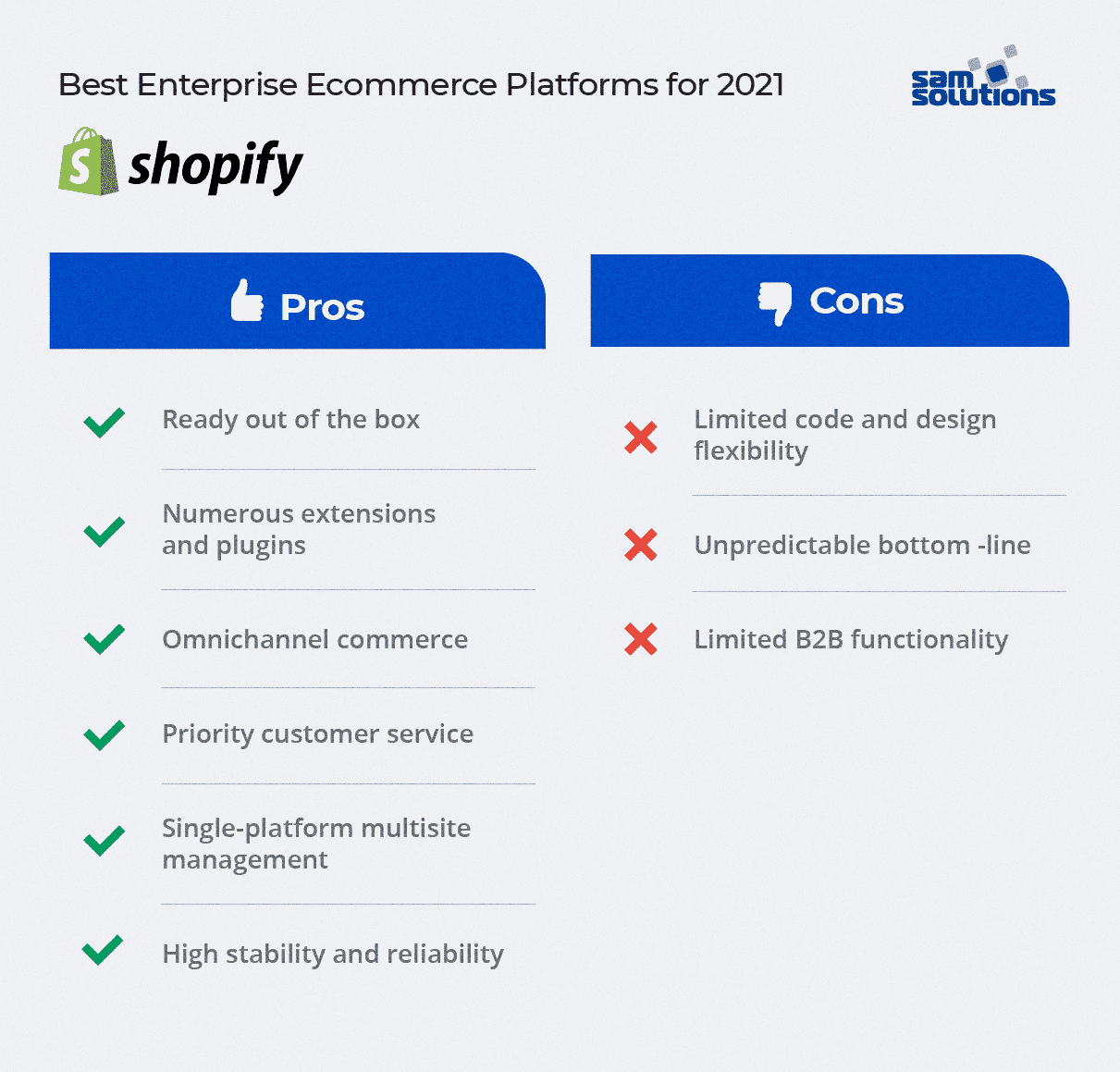
Salesforce Commerce Cloud

The provider of a leading CRM platform, Salesforce created an outstanding solution for online commerce — Salesforce Commerce Cloud. It includes the following components:
- Salesforce B2C Commerce for efficient, user-specific retail sales
- Salesforce B2B Commerce for streamlined, win-win wholesale operations
- Commerce Cloud Endless Aisle for individually tailored shopping experiences based on impeccable product management
- Commerce Cloud Order Management for flawless, unified order management
With this all-round platform, enterprises get the following business benefits:
- Omnichannel sales
- Customer behavior analytics and content personalization based on Salesforce Einstein personalization engine
- User-specific customer experiences
- Wide variety of touchpoints within the system, including mobile apps, POS, etc.
- Single-platform management of globally distributed websites and locations
- 24/7 customer support
- Unlimited customization
- Easy integrations for the holistic eCommerce ecosystem
This powerful enterprise eCommerce platform also has its drawbacks:
- Programming expertise is required as Salesforce development is not intuitive.
- Sales-based pricing may lead to an extremely high final cost.
- There is a limited number of implementation agencies.

Oracle Commerce
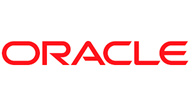
Oracle provides a comprehensive B2C and B2B enterprise eCommerce ecosystem that derives data from the CRM and other enterprise-level software to create customer-specific shopping experiences and end-to-end, easily scalable business environments — Oracle CX Commerce. It’s a comprehensive business suite that includes a variety of CX software for accounting, inventory management, shipping, etc.
Among the core advantages that Oracle Commerce provides to enterprises are:
- cross-channel B2C and B2B sales
- API-driven architecture that encourages unlimited flexibility and customization
- AI-based analytics and content personalization
- integrated CPQ
- consistent omnichannel content management
- efficient mobile application.
Unfortunately, this well-thought-out platform also has significant disadvantages:
- Shortage of experienced partners
- The lack of eBay and Amazon integrations
- High cost
- No one-click checkout
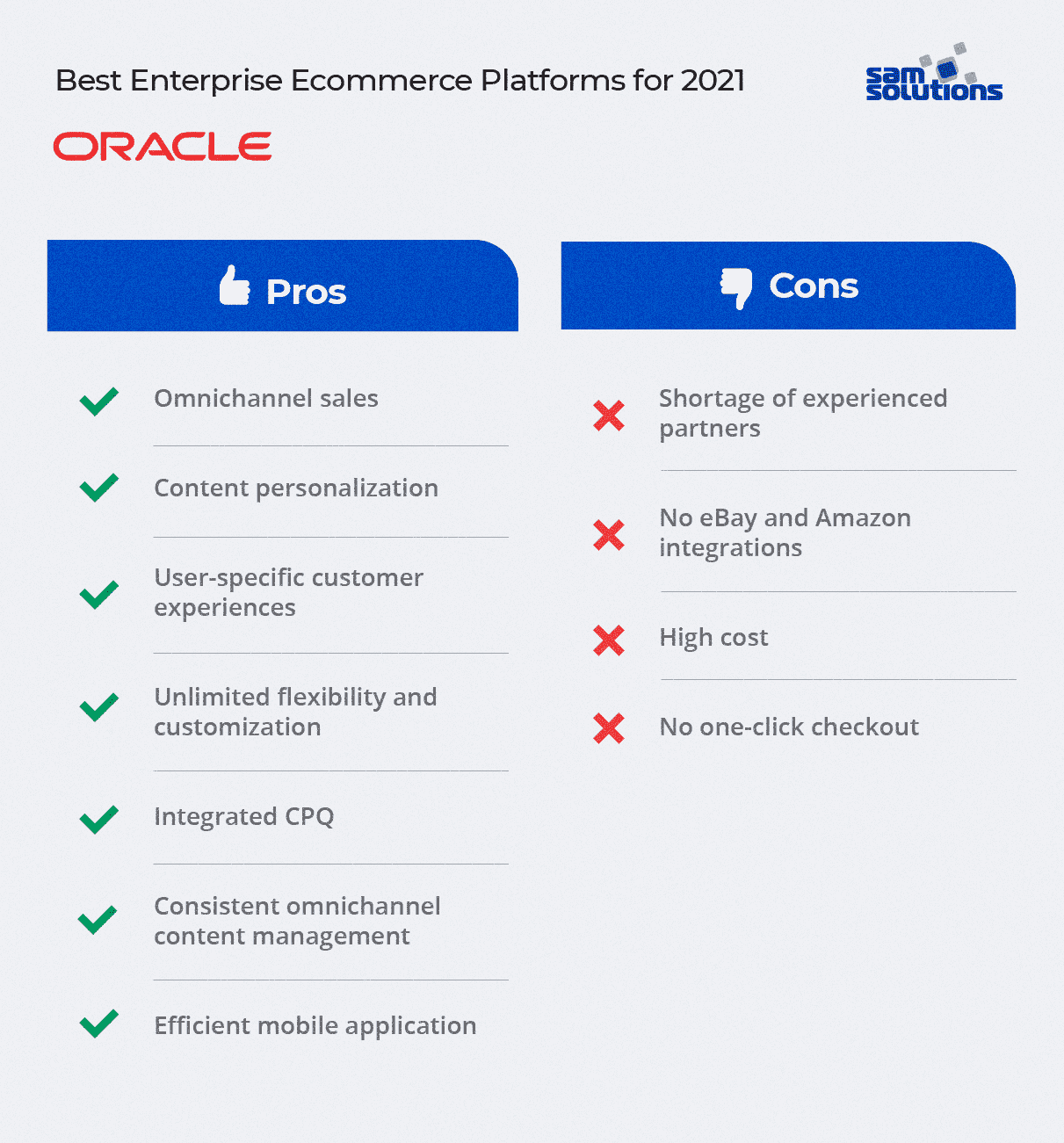
The Decision to Shape Your Business Future
As one can see from this selection of top enterprise eCommerce platforms, they all have much in common. Being expensive, they allow businesses to create end-to-end enterprise eCommerce environments that make the most out of AI-based customer experience personalization and process automation.
It’s impossible to give sound advice without studying up on the company’s specifics and requirements, which is why we highly recommend talking to a seasoned enterprise eCommerce partner.
Feel free to contact our experts for a consultation to choose and create an enterprise eCommerce system that will add value to your business.



















 The Latest 15 Information Technology Trends in 2024
The Latest 15 Information Technology Trends in 2024 Top 10 Embedded Software Development Tools
Top 10 Embedded Software Development Tools IaaS vs. PaaS vs. SaaS: What’s the Difference?
IaaS vs. PaaS vs. SaaS: What’s the Difference? 10 Examples of Predictive Analytics
10 Examples of Predictive Analytics






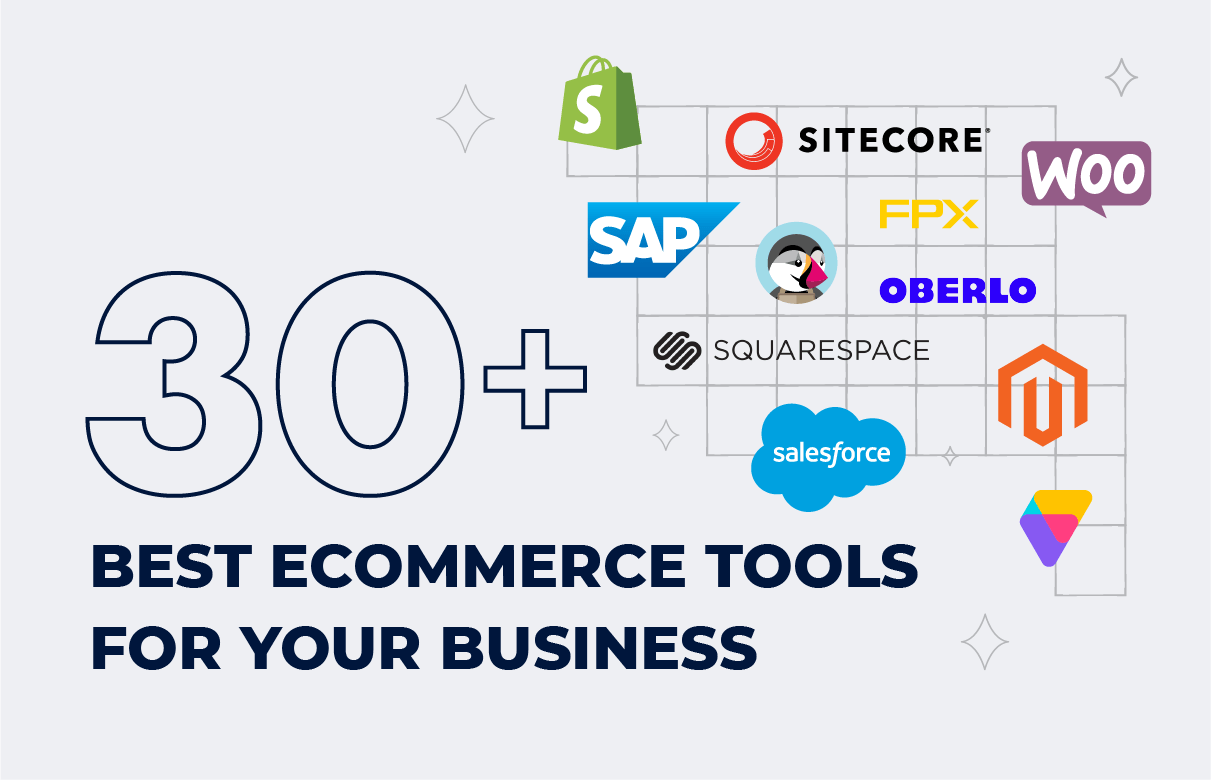

![What Is Ecommerce Customer Service? [Including 8 Best Practices]](https://www.sam-solutions.com/blog/wp-content/uploads/Customer-Service-in-eCommerce.png)



 Web App Development Cost in 2025 [Key Price Factors]
Web App Development Cost in 2025 [Key Price Factors] 13 Best React Development Tools in 2025
13 Best React Development Tools in 2025 Top 10 Mobile App Development Trends 2025
Top 10 Mobile App Development Trends 2025 Top IoT Industry Trends in 2025
Top IoT Industry Trends in 2025 Java Web App Security: Everything You Need to Know
Java Web App Security: Everything You Need to Know
Great!
Very informative post and thank you for sharing it.
Oh, cost estimation is a big deal, could never imaged that. So many components to foresee and take into consideration.
We have SAP at our company, and it’s really awesome! It brings all operations in one place, it’s so smooth and efficient. Of course, it comes at a price, but it’s worth every penny!
As far as I understand, all of the eCommerce platforms you’re talking about provide headless content delivery, and that’s a big thing, I say! It is so much easier to approach customers in such a way!
Increase profits, better UX/UI, reduced expenses — these promises are so glittering, and I’m sure that one of the solutions from the list will definitely help realize them!
Thank you so much for such an exhaustive guide! When it comes to decision-making, my head is in a whirl. But you’ve made the choice of an eCommerce platform so much easier for me.